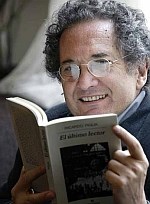L’articolo è stato aggiunto alla lista dei desideri
The Way Out
Cliccando su “Conferma” dichiari che il contenuto da te inserito è conforme alle Condizioni Generali d’Uso del Sito ed alle Linee Guida sui Contenuti Vietati. Puoi rileggere e modificare e successivamente confermare il tuo contenuto. Tra poche ore lo troverai online (in caso contrario verifica la conformità del contenuto alle policy del Sito).
Grazie per la tua recensione!
Tra poche ore la vedrai online (in caso contrario verifica la conformità del testo alle nostre linee guida). Dopo la pubblicazione per te +4 punti
Prezzo minimo ultimi 30 giorni: 11,33 €



Tutti i formati ed edizioni
Promo attive (0)
Emilio Renzi, literary alter ego of legendary Argentine author Ricardo Piglia, returns in The Way Out, an academic thriller that relentlessly questions the lengths we go to hide our own truths and to uncover the secrets of others. In the mid 1990s Emilio Renzi leaves behind his unstable life in Argentina to take a visiting position at a prestigious university in New Jersey. Settling in for a semester of academic quietude and wintry isolation, he is surprised to be swept up in a secret romance with his colleague, the brilliant and enigmatic Ida Brown. But their clandestine relationship comes to an abrupt end when Ida is discovered in her car, killed in what appears to be a tragic accident. Discontented with the police’s lackluster inquiries, and troubled by the inexplicable burn found on her hand, Renzi begins his own investigation. Renzi's suspicions are piqued as details emerge about a bizarre string of attacks, apparently targeting scientists and researchers. But after a radical manifesto appears in the press threatening continued violence, the killer's identity is suddenly revealed. As he delves deeper into Ida Brown’s past, Renzi discovers a link between her and the terrorist that sets him on a path of no return: he must discover once and for all whether her death was part of a larger pattern and, if so, whether she was a victim or accomplice. Renzi’s quest for truth reveals not only the secrets of his former lover, but also reveals a darker side of humanity that will force him to confront the systems and culture that could produce such a misguided killer. A bracing critique of American culture and an exploration of privacy and politics in an era of rapid technological advancement, Piglia’s signature blend of autobiography and fiction is in full effect in this intriguing twist on the detective novel. Amid meeting redheads at bars, he dissects styles and structures with a surgeon’s precision, turning his gaze on a range of writers, from Plato to Dashiell Hammett, returning time and again to Pavese, Faulkner, Dostoyevsky, Arlt and Borges. Chock-full of lists of books and films he consumed in those voracious early years of call girls, carbon paper, amphetamines and Heidegger, this is an embarrassment of riches — by turns an inspiring master class in narrative analysis, an accounting of the pesos left in his pockets and a novel of Piglia’s grandfather (named Emilio, natch) with his archive of World War I materials pilfered from Italian corpses…. No previous familiarity with Piglia’s work is needed to appreciate these bibliophilic diaries, adroitly repurposed through a dexterous game of representation and masks that speaks volumes of the role of the artist in society, the artist in his time, the artist in his tradition.” —Mara Faye Lethem, The New York Times Book Review “For the past few years, every Latin American novelist I know has been telling me how lavish, how grand, how transformative was the Argentinian novelist Ricardo Piglia’s final project, a fictional journal in three volumes, Los diarios de Emilio Renzi—Renzi being Piglia’s fictional alter ego. And now here at last is the first volume in English, The Diaries of Emilio Renzi: Formative Years, translated by Robert Croll. It’s something to be celebrated… [It] offer[s] one form of resistance to encroaching fascism: style.” —Adam Thirlwell, BookForum, The Best Books of 2017 “[A] masterpiece…. everything written by Ricardo Piglia, which we read as intellectual fabrications and narrated theories, was partially or entirely lived by Emilio Renzi. The visible, cerebral chronicles hid a secret history that was flesh and bones.” —Jorge Carrión, The New York Times “A valediction from the noted Argentine writer, known for bringing the conventions of hard-boiled U.S. crime drama into Latin American literature...Fans of
L'articolo è stato aggiunto al carrello
Formato:
Gli eBook venduti da Feltrinelli.it sono in formato ePub e possono essere protetti da Adobe DRM. In caso di download di un file protetto da DRM si otterrà un file in formato .acs, (Adobe Content Server Message), che dovrà essere aperto tramite Adobe Digital Editions e autorizzato tramite un account Adobe, prima di poter essere letto su pc o trasferito su dispositivi compatibili.
Cloud:
Gli eBook venduti da Feltrinelli.it sono sincronizzati automaticamente su tutti i client di lettura Kobo successivamente all’acquisto. Grazie al Cloud Kobo i progressi di lettura, le note, le evidenziazioni vengono salvati e sincronizzati automaticamente su tutti i dispositivi e le APP di lettura Kobo utilizzati per la lettura.
Clicca qui per sapere come scaricare gli ebook utilizzando un pc con sistema operativo Windows
L’articolo è stato aggiunto alla lista dei desideri


